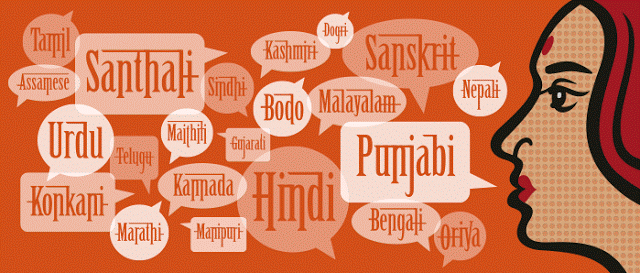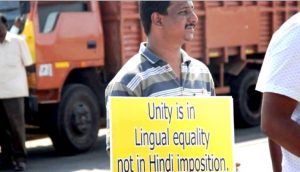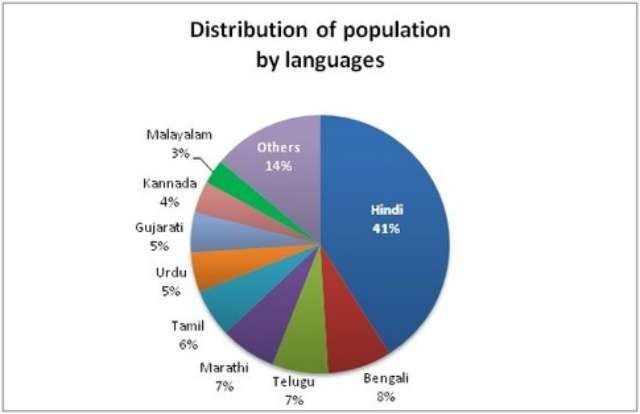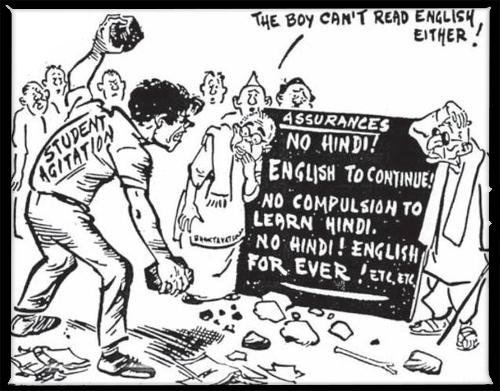In India, the recent fight over Hindi on milestones alongside the National Highways in Tamil Nadu and the political pressure to do away with the Hindi language on the milestones leads to a very serious question – why do we call Hindi our National Language? The National Highway Authority of India (NHAI) has switched back to English language on milestones. And to add to the dilemma, calling it an attempt by the Union Government to impose Hindi in Tamil Nadu, leaders of political parties warned rekindling with the 1960s anti-Hindi stir: these were series of agitations that happened in Tamil Nadu, during both pre-and-post Independence periods. The agitations involved several mass protests, riots, student and political movements in Tamil Nadu concerning the official status of Hindi language in the state.
A glaring fact in our nation is that the southern states have never been comfortable with Hindi. In the south, more people are comfortable in English than Hindi. The claims that Hindi is our national language have also involved huge criticism. According to the Indian Constitution, all 22 major languages in the country are considered national languages and Hindi and English are the two main official languages. However, according to Wikipedia about 100 crore people in India do not speak Hindi. They do not understand a word of Hindi. This works out to a whopping 75% of Indian population. It does not make sense to use a language that many do not understand.
Why English is given more preference than Hindi? We are fascinated with English so much in our country. If an educated man/woman cannot converse in English we look down upon them. We take pride in educating ourselves and our children in English medium. If someone can’t speak English he/she is considered inferior. English speaking people have higher chances of employability. India is the only country in the world, where above 55% of citizen don’t know the national language. Look at countries such as Italy, Germany, Belgium, Spain, France etc. The citizens speak in their National language and very few of them know English. But still these countries are counted among the Cultured and Advanced Countries in the world.
Hindi versus English debate has now become a Hindi versus rest of the Indian languages. People argue that the Centre can promote Hindi in Hindi speaking states and may even replace English with Hindi in these states. But, it must not do the same in non-Hindi speaking states, which really makes sense. It is sheer common sense that instead of replacing English with Hindi on the milestones, the NHAI should have added Hindi as third option on the milestones. India is the most diverse nation in the world. The beauty of our country lies in the diversity. In Southern states, people know English better. At school, children study 6 subjects in English and one additional language is Hindi. That means most of our idea formation happens in English. Hindi takes backseat just as third language. India is a cacophony of languages. But again a contrasting fact is Indians enjoy Bollywood movies which are made in Hindi language.
English is understood by all educated Indians. For many in the Southern states, Hindi is far more accented than English is. Even though the supporters of Hindi are claiming that over 70 per cent of India speaks Hindi, the reality speaks of a different situation. According to 2001 Census figures, just 45 per cent people speak or know Hindi. But, just 25 per cent people in India have declared Hindi as their mother tongue. A little over 25 crore actually speak Hindi, says Census 2001. The remaining people speak variants of Hindi like Bhojpuri, Magadhi, Maithili, Garhwali, Dogri, Rajasthani, Marwari, Haryanvi etc. All put together, the speakers of Hindi and its dialects are about 45 per cent. It proves that remaining 55 per cent speak non-Hindi languages and the majority people in India don’t even know Hindi.
Harsh Truth: Apart from naming National Schemes in Hindi the Ministers use many Hindi words in their English speeches. Isn’t this absurd? In most other countries in world, political leaders and prominent people use their local language while giving speeches, and they take pride in it even if they are literate in English.
In 2010, Gujarat High Court observed that though majority of people in India have accepted Hindi as a national language, there was nothing on record to suggest that any provision has been made or order issued declaring Hindi as a national language of the country. The observation was made by division bench of Chief Justice S.J. Mukhopadhaya and justice A.S. Dave while rejecting a Public Interest Litigation (PIL) by one Suresh Kachhadia. Mr. Kachhadia had filed the PIL seeking direction to Central and State government to make it mandatory for manufacturers to print details of goods like price, ingredients and date of manufacture in Hindi.
According to the 2001 Census, 42 crore people speak or understand Hindi all over India. But, only 25 crore declared Hindi as their mother tongue. 8.5 crore people speak Bengali, 7.5 crore people speak Telugu, 7 crore speak Marathi and 6 crore speak Tamil.
5 crore speak Urdu, 4.6 crore speak Gujarati, 4 crore speak Kannada, 3.5 crore speak Malayalam, 3.3 crore speak Oriya, 3 crore speak Punjabi, 1.5 crore speak Assamese, 64 lakh speak Santhali and 55 lakh speak Kashmiri languages. People in the north eastern states speak more than 50 different dialects. Tribals in non-Hindi speaking and non-north eastern states also speak different dialects. These dialects have nothing to do with Hindi or its variants. The languages like Konkani, Tulu, Kodava, Beary, which are spoken in Karnataka also have nothing to do with Hindi.
It is high time that the Centre must carefully look into the Census data before claiming that over 70 per cent speaks or understands Hindi. Eminent modern historian and writer Ramachandra Guha in a tweet said, “One should remember that Pakistan split, and Sri Lanka plunged into civil war, because of the mistaken belief in a single national language.”
Conclusion: India is already divided into so many religions, 3000 plus castes and sub-castes, 36 States/UTs, North India, South India, 780 languages etc. Can we afford one more discordant factor based on Hindi and non-Hindi? I think it sounds wired to split the nation into more and more divisive parameters. Let us save our energies and play on the uniting factors more, to strengthen national unity. It makes sense to make all the 22 ‘regional languages’ of the Nation as official languages of India. This makes us more unique, and we can boast that we have maximum number of official languages!!
















































